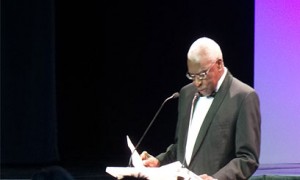IAAF, govt. to build blood centre in Nairobi
Posted by XINHUA on November 27, 2013
 NAIROBI, Kenya, November 27- World athletics governing body IAAF and Kenyan government are to build a blood center to hold and test blood and urine samples from regional athletes in Nairobi starting January.
NAIROBI, Kenya, November 27- World athletics governing body IAAF and Kenyan government are to build a blood center to hold and test blood and urine samples from regional athletes in Nairobi starting January.
Athletics Kenya (AK) President Isaiah Kiplagat confirmed on Wednesday that the plans are at an advanced stage to start building a laboratory to be used as the blood center, in their fight against doping.
“We are going to build a blood center in Nairobi starting January. The center will serve Ethiopia, Kenya, Uganda, Rwanda and the central Africa region,” he said.
“This will reduce the cost and time it takes to get results whenever we take our samples to Germany or South Africa,” Kiplagat said in Eldoret.
According to Kiplagat, over 650 athletes were tested both in and out of competition from Kenya this year. Only 17 were caught after their B samples returned positive.
IAAF has sent its doctor Dr. Giussepe Fischetto, who is in charge of anti-doping, to help sensitize the athletes, in the wake of World Anti-Doping Agency claiming that Kenya and Jamaica, the two best countries in track and field, have not done enough to curb the vice.
Fischetto asked athletes to consult with sports doctors to know the components of drugs and those that they should avoid.
Already IAAF has agreed to prolong the two-year ban to four years on first offenders and lifetime ban for repeat cheats in tandem with the call by WADA.
Posted by XINHUA on November 27, 2013
0
inShare
inShare
 NAIROBI, Kenya, November 27- World athletics governing body IAAF and Kenyan government are to build a blood center to hold and test blood and urine samples from regional athletes in Nairobi starting January.
NAIROBI, Kenya, November 27- World athletics governing body IAAF and Kenyan government are to build a blood center to hold and test blood and urine samples from regional athletes in Nairobi starting January.Athletics Kenya (AK) President Isaiah Kiplagat confirmed on Wednesday that the plans are at an advanced stage to start building a laboratory to be used as the blood center, in their fight against doping.
“We are going to build a blood center in Nairobi starting January. The center will serve Ethiopia, Kenya, Uganda, Rwanda and the central Africa region,” he said.
“This will reduce the cost and time it takes to get results whenever we take our samples to Germany or South Africa,” Kiplagat said in Eldoret.
According to Kiplagat, over 650 athletes were tested both in and out of competition from Kenya this year. Only 17 were caught after their B samples returned positive.
IAAF has sent its doctor Dr. Giussepe Fischetto, who is in charge of anti-doping, to help sensitize the athletes, in the wake of World Anti-Doping Agency claiming that Kenya and Jamaica, the two best countries in track and field, have not done enough to curb the vice.
Fischetto asked athletes to consult with sports doctors to know the components of drugs and those that they should avoid.
Already IAAF has agreed to prolong the two-year ban to four years on first offenders and lifetime ban for repeat cheats in tandem with the call by WADA.